Dogfight over HK
Updated: 2013-09-20 15:33
By Wong Joon San and Li Tao(HK Edition)
|
|||||||
The upstart airline, Jetstar Hong Kong, is preparing for take-off, but the city's established airlines are making every effort to clip the wings of this new, low-cost entry into the air travel market. Wong Joon San and Li Tao examine the issues.
The established competition may have a tough fight keeping Jetstar Hong Kong out of the city's air-travel market. The fledgling airline has heavyweight backing and there's a dogfight brewing over control of the skies above Hong Kong.
Jetstar Hong Kong's chief backers are Australia-based Qantas Airways and Jetstar Australia. The other shareholders are Shanghai-based China Eastern and most recently, Shun Tak Holdings, the listed conglomerate founded by Macao gambling tycoon Stanley Ho Hung-sun.
Hong Kong's leading air carrier, Cathay Pacific and its subsidiary, Dragonair, have filed interventions, charging that Jetstar Hong Kong's principal base of operations will be Australia, where the fledgling carrier's prime backers are located. That would breach Article 134 of the Basic Law, which stipulates that Hong Kong must be the airline's principal base of operations.
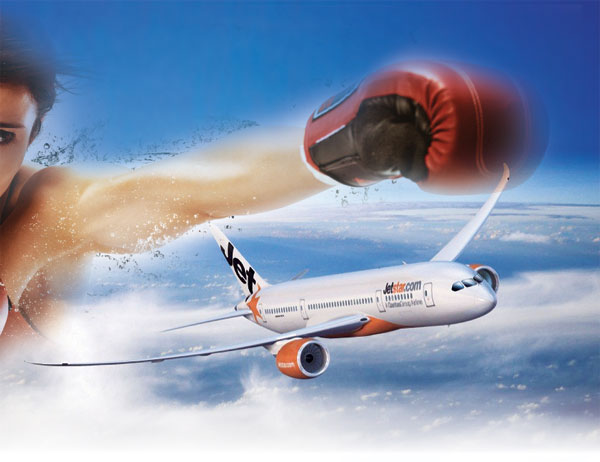
The complaint by Cathay and Dragonair, also noted that there is only limited capacity at Hong Kong International Airport (HKIA), and that what remains ought to be made available to benefit the interests of Hong Kong. Cathay Pacific and Dragonair doubted that Jetstar Hong Kong's business model, "will make the best use of the remaining available slots at HKIA," continuing, this is particularly important, "since the third runway at the airport, if approved, is not expected to be in operation before 2023," the statement said.
The argument by Cathay and Dragonair continued: "We are not against competition. We compete successfully in Hong Kong and elsewhere in the region each and every day, but we do not believe this is a matter of competition. This application raises important legal and public interest issues which could have very clear negative implications for the Hong Kong economy.
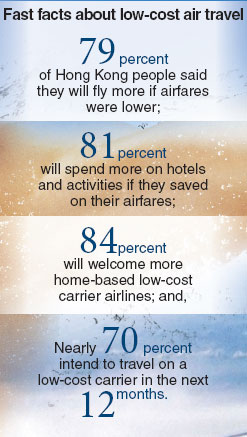
"Granting a license to a foreign-controlled airline would set a very negative precedent that would undermine the health of aviation in Hong Kong. Approval of this application, therefore, would not be in the best interests of the Hong Kong economy and it would be contrary to the Basic Law," the two airlines asserted.
A week after Cathay Pacific issued its blistering attack on Jetstar, Hong Kong Airlines and its sister carrier, Hong Kong Express, acknowledged that they too have filed interventions with authorities opposing the budget airline's application to fly out of Hong Kong.
Unlike Cathay, Hong Kong Airlines and Hong Kong Express have not made public their reasons for opposing Jetstar. Their short public statement read simply, "we believe that the government will make the appropriate judgment based on the long-term development of the local aviation industry and the overall economic interests of Hong Kong."
At approximately the same time, last week, Hong Kong Express revealed details of its plans for low-cost air passenger services.
For Cathay Pacific, the timing of this challenge from a new budget airline that wants to compete for traffic on its home turf, is especially inconvenient. The airline already has a major problem finding customers to fill its premium seats. The cooling of China's economy has put a huge squeeze on Cathay's passenger traffic.
In August, Cathay Pacific announced that Ivan Chu, 51, will become its next chief executive. Chu will take over after the company's annual results are announced in March, 2014. Chu has been at Cathay for 29 years and took over as chief operating officer in March 2011. Whatever strategy he sets down will determine whether the airline retains its dominant 50 percent share of passenger traffic out of the former British colony.
Jetstar Hong Kong's entry into the local market is by no means assured. Local opposition is fierce. Even historical evidence argues against Jetstar's success. Oasis Hong Kong Airlines Ltd., which operated budget, long-haul flights, collapsed in 2008 after racking up losses of HK$1 billion in less than two years.
Jetstar Hong Kong
Jetstar Hong Kong's chairman, Pansy Ho Chiu-king, on Sept 11, rejected all charges against the airline. She said Hong Kong still has plenty of room for low-cost carriers. She maintained that a new budget airline would complement services rather than touch-off "vicious competition".
Speaking to the media for the first time since taking the helm in August, Ho, daughter of Stanley Ho, rejected the claim by Hong Kong-based airlines that the decision-making authority at Jetstar Hong Kong would reside outside the city.
She lashed out at the allegations advanced by Cathay and Dragonair that Jetstar Hong Kong's locally-based shareholders would have no say in management of the airline and that the city would not be the "principal place of business (as required) under the Basic Law."
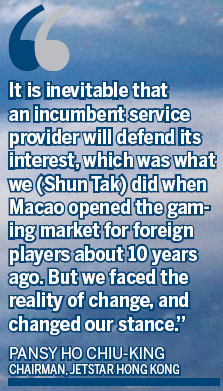
"Five out of the seven Jetstar board members (including myself) are Hong Kong people, who hold permanent resident Hong Kong identity cards," Ho said, pointing out that the two others include a mainland representative of China Eastern and another of Qantas. Our company is based in Hong Kong and our decision-making is in the city," she said. "(The majority of) our board members live in Hong Kong and they provide real service to Hong Kong."
She added her own jibe at the opposition, saying Jetstar Hong Kong is not like another airline with shareholders outside Hong Kong to which important decisions must be referred. It was an apparent reference to Cathay Pacific. Swire Pacific is Cathay Pacific's principal shareholder, with a 45 percent shareholding, while the other major shareholder is Air China (30 percent). Remaining shares are floated. Cathay Pacific is a publicly listed company on the Hong Kong Stock Exchange.
The Ho family's listed flagship, Shun Tak Holdings, spent $66 million in June for a one-third share of Jetstar Hong Kong, which is now split three ways between itself, China Eastern Airlines and Qantas Airways.
Ms Ho also pointed out that since Jetstar Hong Kong had not yet started operations, its expenses were quite low.
Her statement allayed some concerns that Jetstar Hong Kong would face huge debts, putting it out of action even before it could obtain approval from aviation authorities.
Ms Ho substantiated her case that Hong Kong needs a budget airline, because Cathay's weekly promotion on discount fares, or "fanfares", is proof of the strong demand for discounted air tickets in the city.
Ho says: "It is inevitable that an incumbent service provider will defend its interest, which was what we (Shun Tak) did when Macao opened the gaming market for foreign players about 10 years ago. But we faced the reality of change, and changed our stance."
Contact the writer at joonsan@chinadailyhk.com
litao@chinadailyhk.com
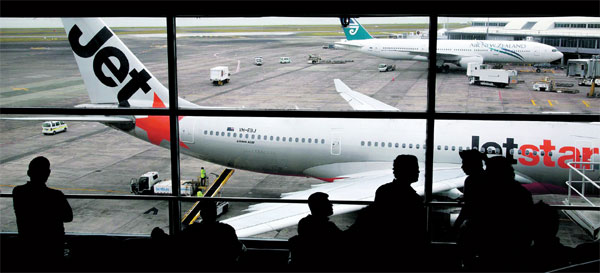
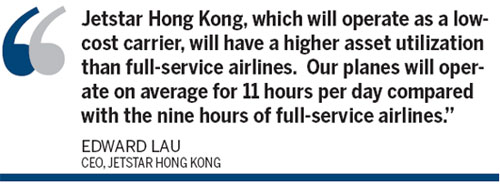
(HK Edition 09/20/2013 page6)